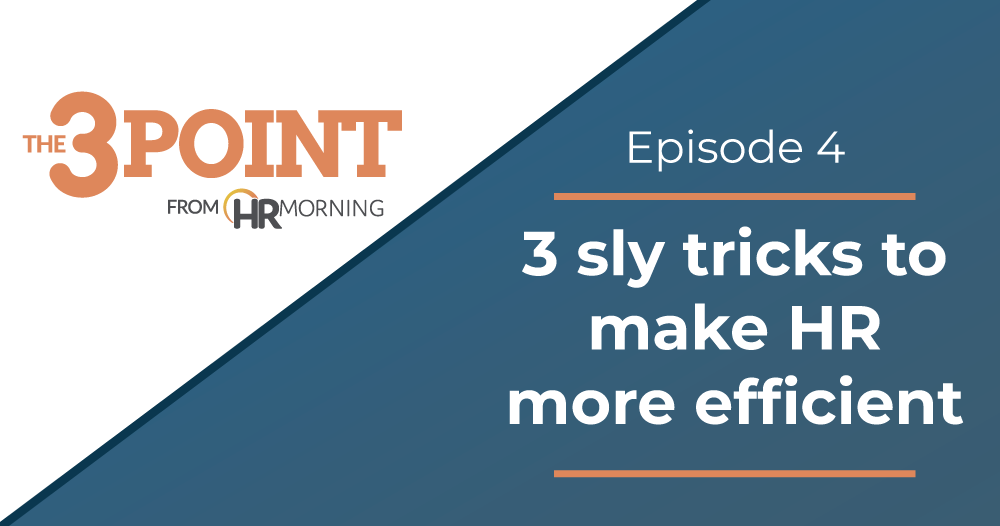Can you make HR more efficient? Almost certainly.
But when we start the work to improve efficiency, it usually feels like more work. Making change happen is laborious and time-consuming. And that’s mostly because we try to make great big changes all the time.
And then guess what happens? About 65% of change management initiatives fail, Gartner researchers found. Sweeping changes to improve efficiency — usually big investments in technology, resources and time — are often too much for too many to take on at one time.
So instead of going big when HR needs to make changes, maybe aim small. Try little tweaks that can help make HR more efficient. Once you try it, you can likely lead the way in making other areas and processes more efficient.
Tweaks make HR more efficient
Here, in our 3-Point from HRMorning video series, we talked with experts in the field on how they stay efficient or have taken steps to improve operations. One idea is attack meetings. Another: Get the right people in the right places. Plus, there’s one of my favorite tips of all time — let’s call it “The Lazy Guy’s Approach to Problem-Solving.”
Watch and listen for more from a few of our panel of experts.
Transcript (edited for clarity):
We’ve done a good job of making things complicated at work. Since the pandemic started, HR and nearly every other department has added meetings, approvals and processes.
That’s extra time and effort to do the things that used to just happen with a handshake.
Consider this: the number of workplace meetings has doubled since 2020 and meeting time, it’s tripled. That’s data from Microsoft. So is it time to reel it back in?
Surely everyone can agree it is, but how?
Angel Davis is the VP of Strategic Brand Marketing at Exos, and they’ve made serious business of getting rid of the extraneous.
Davis: Really doing a meeting audit and saying, do we need this number of meetings? Do we need meetings to be this long? Does everyone need to be in a meeting? Do we have an objective for this meeting? Really doing a meetings audit, um, is a part of our readiness culture code as well.
Next step, Make people more efficient at what they already do.
Smith: You Gotta figure out how to get things done through people and really empowering your people to do the work. So I think you really need to spend time with your managers, find out what their skills are, don’t make assumptions and really meet them where they’re at and help them upscale.
McGovern: Okay, so this last tip is a personal favorite of mine in 25 years of business journalism. I’ve shared it countless number of times. I have a friend who’s a manager, and she always asks Hank what he thinks. You know Hank — sits in the back of the room, arms crossed, rolling his eyes. Every sign of disengagement. You see, Hank’s lazy. He wants the path of least resistance. So Hank picks the easiest way out of everything. Guess what? It’s almost always the most efficient way to do things. So always ask the lazy guy too.
So let’s rethink how we’ve been operating and regain some efficiency. How?
- Audit it. Don’t just call meetings. Scrutinize if you should really have them
- Analyze it. Find out what managers’ skill sets are and help them upskill that, and
- Ask the lazy guy. See what he thinks. He may know a good idea or two.
We can all use more time and energy. So let’s start taking steps to uncomplicate work.


